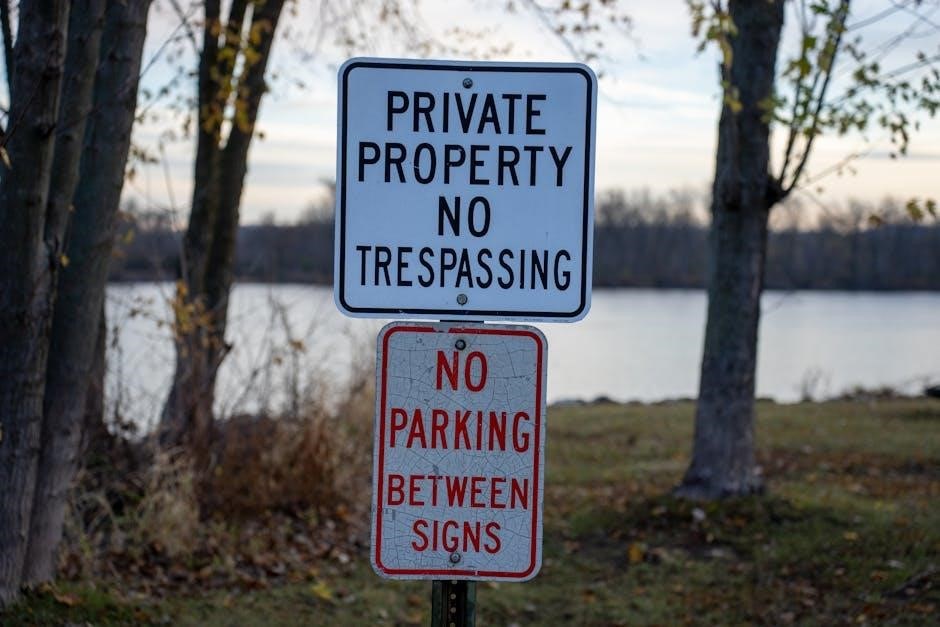The Good Cause Eviction Law Notice is a legal document required in all leases, ensuring tenants are informed about their protections against unreasonable evictions and rent increases, promoting housing stability․
Overview of the Good Cause Eviction Law
The Good Cause Eviction Law, enacted in April 2024, provides robust protections for tenants by regulating eviction practices and rent increases․ It mandates that landlords must demonstrate a legitimate reason, or “good cause,” to terminate a lease or evict a tenant․ This law aims to prevent unjust evictions and stabilize housing by limiting excessive rent hikes and ensuring tenants receive proper notice․ Key provisions include restrictions on annual rent increases, protections against unreasonable evictions, and specific requirements for lease renewals․ The law applies to most residential properties, though certain exemptions exist for owner-occupied buildings and cooperative units․ Its implementation has significant implications for both tenants and landlords across the state․
Importance of the Good Cause Eviction Law Notice
The Good Cause Eviction Law Notice is crucial for ensuring transparency and fairness in tenant-landlord relationships․ By requiring landlords to inform tenants about the law’s protections, it prevents unlawful evictions and excessive rent increases․ Tenants gain clarity on their rights, fostering a sense of security and stability․ The notice also serves as a legal safeguard, ensuring landlords comply with the law and tenants are aware of their options if disputes arise․ This measure promotes housing stability and equity, ultimately benefiting both tenants and the broader community by maintaining affordable and secure housing options․ Its inclusion in leases is a cornerstone of tenant protection policies․

Key Provisions of the Good Cause Eviction Law
The law establishes rent increase limits, protects tenants from unreasonable evictions, and mandates specific notices for lease renewals and terminations, ensuring fair housing practices for all renters․
Rent Increase Limits Under the Law
The Good Cause Eviction Law sets specific rent increase limits, capping annual hikes at 10% or 5% plus inflation, whichever is higher․ Landlords must adhere to these caps to ensure affordability and prevent excessive increases that could displace tenants․ This provision aims to balance property owners’ needs with tenants’ rights, fostering a fair rental market․ By linking increases to inflation, the law adapts to economic conditions while safeguarding tenants from sudden, unmanageable rent jumps․ Compliance with these limits is crucial for landlords to avoid legal repercussions and maintain tenant stability․
Protections Against Unreasonable Evictions
The Good Cause Eviction Law provides robust protections against unreasonable evictions by requiring landlords to demonstrate a legitimate reason for eviction․ Tenants cannot be evicted without “good cause,” such as non-payment of rent or violation of lease terms․ Landlords must provide written notice detailing the cause and, in many cases, allow tenants an opportunity to cure violations within a specified period, typically 10 days․ This ensures tenants are not unfairly displaced and have recourse to address issues before eviction proceedings․ The law promotes housing stability by preventing arbitrary or retaliatory evictions, fostering a fairer rental landscape for all tenants․

Required Notice for Lease Renewals and Terminations
Under the Good Cause Eviction Law, landlords must provide tenants with written notice for lease renewals or terminations․ For lease renewals, landlords are typically required to notify tenants at least 30 days in advance․ If the landlord intends to terminate the lease, they must also provide written notice, specifying the reason for termination, which must be a valid “good cause” as defined by the law․ Tenants must be informed of their rights and any options to respond or cure violations within the specified timeframe․ This ensures transparency and fairness in lease-related actions, safeguarding tenants from sudden or unjust lease terminations․
Legal Requirements for Landlords
Landlords must include the Good Cause Eviction Law Notice in all leases and ensure proper service of the notice, complying with local rent standards and legal protocols․
Mandatory Inclusion of the Notice in Leases
The Good Cause Eviction Law Notice must be included in all leases, both initial and renewal agreements, to ensure tenants are fully informed of their rights and protections․ Landlords are legally required to append or incorporate this notice, as specified by the law, to avoid non-compliance penalties․ The notice outlines the tenant’s protections against unreasonable evictions and excessive rent increases, ensuring transparency and fairness in housing agreements․ Failure to include this document can result in legal consequences, making it a critical component of lease preparation․ Its inclusion helps both tenants and landlords understand their respective obligations under the law․ Proper compliance is essential to maintain legal validity․
Proper Serving of the Good Cause Eviction Notice
Properly serving the Good Cause Eviction Notice is crucial for landlords to ensure compliance with the law․ The notice must be delivered to tenants following specific legal procedures, such as certified mail or personal delivery, to maintain its validity․ Landlords must provide clear documentation of the eviction grounds, whether it’s for non-payment of rent or lease violations, and allow tenants a reasonable timeframe to respond or cure the issue․ Failure to adhere to these serving requirements can result in the dismissal of the eviction case, highlighting the importance of precise legal protocol in this process․
Compliance with Local Rent Standards
Under the Good Cause Eviction Law, landlords must comply with local rent standards to ensure rent increases are reasonable and not excessive․ The law ties annual rent hikes to the local inflation rate, typically capping increases at 5% plus inflation or 10%, whichever is lower․ This measure aims to protect tenants from unjustified rent spikes while allowing landlords to cover costs․ Adherence to these standards is non-negotiable, and any violation can lead to legal consequences, reinforcing the law’s goal of maintaining affordable housing and preventing economic displacement of tenants․

Tenant Protections Under the Law
The Good Cause Eviction Law ensures tenants cannot be evicted without valid reason, protecting them from unjust removal and providing stability in their housing situations․
Prohibition of Evictions Without Good Cause
The Good Cause Eviction Law prohibits landlords from evicting tenants without valid justification, ensuring renters are protected from unjust removal․ Under this provision, landlords must demonstrate a legitimate reason for eviction, such as non-payment of rent, lease violations, or illegal activities․ Tenants cannot be evicted solely for requesting repairs or exercising their legal rights; This safeguard aims to prevent arbitrary evictions and provide stability for tenants, balancing property rights with tenant protections․ The law ensures that evictions are fair, reasonable, and based on specific, lawful grounds, fostering a more equitable rental housing system for all parties involved․
Right to Lease Renewal Under Specific Conditions
Tenants under the Good Cause Eviction Law have the right to lease renewal unless specific conditions are met․ Landlords can deny renewal only for valid reasons, such as non-payment of rent, lease violations, or illegal activities․ If a tenant fulfills their lease obligations, they are entitled to continue their tenancy․ This provision prevents arbitrary lease non-renewals and ensures stability for renters․ The law protects tenants from being displaced without just cause, promoting long-term housing security and balancing the interests of both landlords and tenants in maintaining a fair rental relationship․
Notice Requirements for Cure of Lease Violations
The Good Cause Eviction Law mandates specific notice requirements when addressing lease violations․ Landlords must provide tenants with a formal notice detailing the violation and allowing a cure period, typically 10 days․ This notice must outline the specific breach and the necessary corrective action․ If the tenant remedies the violation within the specified timeframe, eviction proceedings cannot proceed․ This provision ensures tenants are given a fair opportunity to address issues before facing potential eviction, balancing tenant rights with landlord responsibilities under the law․ Proper compliance with these notice requirements is essential for both parties․

Exemptions and Special Cases
Certain properties, such as owner-occupied buildings and cooperative or condominium units, are exempt from the Good Cause Eviction Law, providing landlords with specific exceptions under the legislation․
Properties Exempt from the Good Cause Eviction Law
Certain properties are exempt from the Good Cause Eviction Law, including owner-occupied buildings with fewer than six units and cooperative or condominium units․ These exemptions allow landlords to manage their properties without the law’s restrictions, ensuring flexibility for smaller-scale owners and specific housing types․ However, even exempt properties must still comply with other applicable housing laws and regulations, maintaining tenant protections outside the scope of this legislation․ Understanding these exemptions is crucial for both landlords and tenants to navigate the legal landscape effectively under the Good Cause Eviction Law framework․
Handling of Owner-Occupied Buildings
Owner-occupied buildings with fewer than six units are generally exempt from the Good Cause Eviction Law, allowing landlords to evict tenants without demonstrating good cause․ This exemption aims to balance tenant protections with the needs of small property owners․ However, landlords must still provide proper notice and comply with local housing regulations․ Tenants in these buildings should review their leases carefully, as the law may not apply, leaving them with fewer safeguards against eviction or rent increases․ Understanding this exemption is vital for tenants to assess their rights in owner-occupied properties under the Good Cause Eviction Law framework․
Cooperative and Condominium Exemptions
Cooperative and condominium units are typically exempt from the Good Cause Eviction Law, meaning the law does not apply to these types of properties․ This exemption allows owners and boards to manage their properties without adhering to the law’s tenant protection provisions․ However, they must still comply with specific notice requirements, such as informing tenants whether the law applies to their unit․ This ensures transparency while maintaining the unique governance structure of co-ops and condos․ Tenants in these properties should be aware of their limited protections and review their agreements carefully to understand their rights under the law․

Enforcement and Penalties
Non-compliance with the Good Cause Eviction Law results in penalties, including fines and legal action․ Regulatory agencies enforce the law, ensuring landlords adhere to its provisions․
Consequences of Non-Compliance for Landlords
Landlords who fail to comply with the Good Cause Eviction Law face significant penalties, including fines and potential legal action․ Non-compliance may result in the eviction being deemed unlawful, requiring landlords to reinstate tenants and cover related costs․ Additionally, repeated violations can lead to increased scrutiny and further legal consequences, emphasizing the importance of adhering to the law’s requirements․ Regulatory agencies actively enforce these measures, ensuring that landlords meet their legal obligations to provide tenants with the protections outlined in the legislation․ Proper compliance is essential to avoid these repercussions․
Tenant Remedies for Violations of the Law
Tenants have legal recourse if landlords violate the Good Cause Eviction Law․ They can challenge unlawful evictions in court and may be entitled to financial compensation․ The law ensures tenants are protected against unfair practices, providing them with the means to seek justice and maintain stable housing․ This includes the right to reinstatement of tenancy under certain conditions․ Tenants can also seek injunctive relief to prevent unlawful eviction proceedings․ By understanding their rights, tenants can effectively assert them, ensuring landlords adhere to legal obligations and respect the protections afforded by the law․
Role of Regulatory Agencies in Enforcement
Regulatory agencies play a pivotal role in enforcing the Good Cause Eviction Law․ They are responsible for ensuring compliance by monitoring landlord actions and addressing tenant complaints․ These agencies provide resources to educate both landlords and tenants about their rights and obligations․ By conducting investigations and imposing penalties, they deter violations and uphold the law’s intent․ Their involvement ensures that tenants receive the protections guaranteed under the legislation, fostering a fair and just rental environment across the state․ Their efforts are crucial in maintaining housing stability and preventing unlawful eviction practices․ Regulatory oversight is essential for the effective implementation of the law․

Leave a Reply
You must be logged in to post a comment.